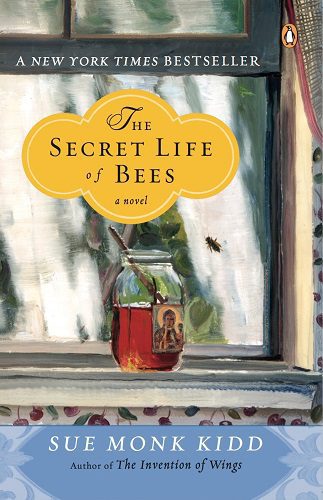 Set in the American South in 1964, the year of the Civil Rights Act and intensifying racial unrest, Sue Monk Kidd’s The Secret Life of Bees is the coming-of-age story of 14-year-old Lily Owens, whose life has been shaped around the blurred memory of the afternoon she accidentally shot and killed her mother when she was four years old.
Set in the American South in 1964, the year of the Civil Rights Act and intensifying racial unrest, Sue Monk Kidd’s The Secret Life of Bees is the coming-of-age story of 14-year-old Lily Owens, whose life has been shaped around the blurred memory of the afternoon she accidentally shot and killed her mother when she was four years old.
When Lily’s black nanny Rosaleen gets arrested for insulting three racists, she springs them both free and they head for Tiburon, South Carolina, a town they know nothing about, but it may hold the secret to Lily’s mother’s past. Taken in by an eccentric trio of black beekeeping sisters, Lily is introduced to a world of bees and honey and the Black Madonna. It is here that she will make her passage to wholeness and a new life.
The Secret Life of Bees is an inspirational tale with a strong cast of quirky and lovable female characters. There are few men in the novel in supporting roles. There isn’t much ambiguity here. The good folks are really good and syrupy-sweet while the bad folks are wholly without decency. The plot is simple and the climax is almost anti-climactic; we already know upon opening that Lily’s mother has been dead for ten years and the secrets of her life turn out to be unremarkable.
The novel is warm and well-meaning. Sisterhood is at the heart of it. The women provide a sanctuary for Lily where she can share her story, have it heard and validated, and be sustained. By setting her novel in 1964, Kidd has given it some depth with racial tensions that move the plot along and provide Lily with an erupting awareness of the cruelty of racism.
One of the most important female characters in The Secret Life of Bees doesn’t have a single line of dialogue. The sisters and their friends are the “Daughters of Mary” and worship the Black Madonna in the form of an old ship’s figurehead. They call her the Lady of Chains and tell the story that the Lord sent the slaves freedom and consolation in the form of this figure.
Published in 2002, I read The Secret Life of Bees because I was told it’s about Goddess worship; it’s not. The Madonna may function as a Divine Mother for many, but saying that her reverence equals Goddess worship is like saying worshipping Jehovah is the same as worshipping Dionysus; it’s not.
There are bits of paganism in The Secret Life of Bees. Ancestry is very important and there are certain attitudes in the novel that can be considered ancestor worship. Nature is important. The sisters are beekeepers and the bee is a powerful symbol of the Goddess. The sisters are Catholic, which is laced with paganism, but they still see the Virgin as an emissary and in her role as mother of Jesus. Mary veneration may fulfil Christian longing for a universal feminine divine, but that longing remains unacknowledged.
At just about 300 pages, The Secret Life of Bees is a quick and easy read.


Really loved this book!